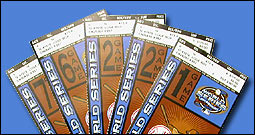
NEW YORK (CNN/Money) -
Many baseball fans think of Max Waisvisz and his competitors as vultures and profiteers who put the prime tickets out of the reach of average Janes and Joes. Their popular name -- scalpers -- is probably one of the most derogatory names hung on any profession.
In fact , most states have laws that are suppose to prevent scalping. Unfortunately, that law -- which has an exception for licensed ticket brokers (like Max) -- only ends up making it more difficult for the individual fan to sell a ticket.
I actually admire and respect many scalpers. They are like market makers in the nation's stock markets -- the ones who have to make the trade themselves if the buy and sell orders don't match up. Scalpers have to take a risk when they buy tickets, acquiring tickets they know will be tough to sell for their cost in order to get the tickets they know they can make a healthy profit on.
 |
|
| Many fans object to prices charged by scalpers for high-demand events like World Series tickets. |
Waisvisz, who works in the Chicago area, estimates that about 15 percent of the tickets he buys he can't sell, but that's a matter of regular season tickets, not post-season games. Those tickets will all disappear.
Regardless of where you stand on the practice, Waisvisz and the average fan should both be concerned about new efforts under way by some sports teams and promoters to turn into scalpers themselves.
The Tribune Co. (TRB: Research, Estimates), which owns the Chicago Cubs, last year opened Wrigley Field Premium Ticket Services a block from the park, which sells very good seats for the games with the highest demand at prices well above face value.
Waisvisz has actually used the Cubs premium service to buy some tickets, as have many other brokers. But that doesn't mean they like the service.
Unlike many average fans looking to sell high-demand tickets, Premium Ticket doesn't need to buy a bunch of tickets with little demand to get the desired ducats. And unlike Waisvisz, it only has to pay face value for its tickets.
"For me to get inventory at face value, I'd be in heaven," he said. "The Cubs won't even sell me seats that they'll sell to season ticket holders at face value since I'm a licensed ticket broker. But it is unfair competition if it's not a level playing field."
| SportsBiz
|

|
| Click here for SI.com sports coverage
|
|
|
|
The Cubs aren't the only ones looking at selling its own high-demand tickets at premium pricing. Ticket retailer Ticketmaster has also conducted a couple of experimental sales of tickets through an auction system, one for a Lennox Lewis boxing match earlier this year, and one for a Sting concert. A spokeswoman for the service said it's up to the sporting or concert promoter, not the ticket selling service, whether to sell some of the tickets at a premium.
The Cubs ticket program is being challenged by a class action suit in Chicago. Kenneth Michaels, one of the attorneys in the case, says that he doesn't oppose brokers, but the team's monopoly position controlling the supply of tickets unfairly distorts the market for the best tickets if it is allowed to be its own broker. The team won't comment on the service due to the suit, although it did not use the service to sell post-season tickets at a premium this year.
A decision is expected next month. Some critics of sports team ownership worry that if the Cubs win the case, other teams will soon follow.
"That's how it goes with every new revenue stream -- once it happens at one place, it's sure to happen at another place," said Shawn McCarthy, director of League of Fans, a Ralph Nader-founded sports project.
Oh, and if you were wondering ... yes, Max was upset about the Cubs and their missed chance at the World Series.
"Tickets would have been $1,000 and up," said Waisvisz, who expected to make more than a half-million-dollar profit from the three games. "Cubs are always a hard seat to get, and for this everyone would have wanted to get in. Now everyone is sitting around here depressed."
The Cubs play in the second-smallest stadium in the majors. The Boston Red Sox play in the smallest. Both teams have legions of rabid fans despite neither team winning a championship in more than 80 years. A Red Sox-Cubs World Series would have been a scalper's dream, as long-suffering fans fought for a severely limited supply of tickets. But both teams were knocked out of the playoffs on the cusp of winning a spot in the series this week.
Instead the match-up will be the New York Yankees, whose fans feel like they'll have a chance to see a World Series almost every year, vs. the Florida Marlins, who normally don't have enough fans to fill the lower deck of their oversized football stadium. Tickets on some brokers' Web sites find some of the tickets with $175 face value for less than $300.

|

